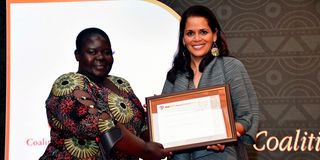Maputo Protocol@20: Kenya's misses on gender equality agenda

Equality Now Global Executive Director Mona Sinha (right) presents an award to Ms Caroline Awuor Agwanda, who won second place in the Inclusion and Diversity category at the 20 for 20 Solidarity Awards at the Movenpick Hotel on July 11, 2023. The awards were held in commemoration of the 20th anniversary of the African Charter on Human and Peoples' Rights on the Rights of Women in Africa (The Maputo Protocol).
What you need to know:
- The country’s performance in implementing the instrument is illuminated in its report to the African Union Commission on the protocol, submitted in 2020.
- It highlights the two-thirds gender rule on political representation but does not convincingly explain why it has so far not been achieved.
July marks the 20th anniversary of the Protocol to the African Charter on the Rights of Women in Africa (Maputo Protocol), which Kenya only acceded to in October 2010 to avoid the imminent embarrassment of hosting the launch of the African’ Women’s Decade 2010-20 without having done so.
The country’s performance in implementing the instrument is illuminated in the first, and so far only, report to the African Union Commission on the protocol, submitted in 2020.
The report celebrates Kenya’s constitutional provisions on gender equality and the passage of the Marriage Act (2014), the Kenya Citizenship and Immigration Act (2011) and the Employment Act (2007).
It highlights the two-thirds gender rule on political representation but does not convincingly explain why it has so far not been achieved, only mentioning vaguely that “the country still faces challenges”. The report’s claim that “women constitute 40 per cent of office bearers of political parties in Kenya” is rather curious given the observable reality.
Rural women
It is mentioned that there is “an increase in the number of rural women participating and contributing in public fora” at the county level. But there are no statistics to confirm this. The County Assemblies Forum is credited for developing a curriculum to strengthen the capacity of female county legislators to influence matters of gender equality.
However, this tendency feminises the role of women legislators, excuses men from equally paying attention to gender issues and even assumes that the latter have automatic capacity on such matters.
Other initiatives reported are the national training curriculum for women aspirants, developed by the Kenya School of Government, and the 2018 Legislative Handbook on Principles of Equality and Non- Discrimination from the National Gender and Equality Commission.
The Trailblazers Programme under the State Department for Gender is cited as a platform for recognising exemplary women. But how it is also used for mentorship, as claimed, is unclear. An interesting revelation is the Democracy Trust Fund launched in 2018 to finance women political aspirants. However, lack of mention of the number of beneficiaries takes away its lustre.
Under education, the report focuses only on the Sanitary Towels Programme, implying that menses is the only gender issue in the sector. What about female genital mutilation (FGM), pregnancy, child marriages, workload and participation in scientific, technological, engineering and mathematical subjects?
Regarding rights related to marriage, the report goes to some length in justifying allowance of polygamy in the Marriage Act (2014). That the protocol itself does not outlaw polygamy implies that Kenya can claim to be compliant.
The report also highlights the High Court ruling that division of matrimonial property based on individual contribution on dissolution of marriage does not contradict the constitutional principle of equality to showcase the state’s fidelity to the law.
The various affirmative funds for women and vulnerable groups are cited but without acknowledging that they are riddled with inefficiency, bureaucracy and unrealistic eligibility conditions. The report notes that widows face discrimination, loss of property and lack of access to justice. But there is no mention of remedial measures.
The section on protection of women from violence is probably the most informative part as it provides statistics, for instance, on trends in the prevalence of FGM and the number of perpetrators prosecuted.
Ambivalence
Despite Kenya entering a reservation on Article 14 of the protocol on health and reproductive rights, the report highlights the National Adolescent Sexual Reproductive Health Policy (2015) as allowing “enhanced provision of high-quality post-abortion care services to adolescents”.
The truth, however, is that Kenya remains ambivalent about this subject as evident in withdrawal of the 2012 Standards and Guidelines for Reducing Morbidity and Mortality from Unsafe Abortion in Kenya. This withdrawal was declared unconstitutional by the High Court in 2019 after a petition by civil society.
The report does not say whether the guidelines were reinstated thereafter. The government’s ultra-conservative and theocratic positions on the matter is, however, clear from ministerial remarks. Mentioning the Assisted Reproductive Technology Bill as an achievement is also insincere because this remains a proposal which has been in abeyance since 2013.
On peace, the report highlights the National Action Plan for implementing the United Nations Resolution 1325 on Women, Peace and Security. The training of 68 male and 67 female officers on preventing gender-based violence perpetrated in contexts of conflict is praiseworthy. But it would have also been useful to show what else has been achieved from that plan, and explain why the peace and security sector remains male-dominated and stereotyped.
It is clear that Kenya has an impressive array of laws on women’s rights. That gender inequality remains a thorny issue, therefore, means that the problem lies elsewhere - deficient enforcement and socio-cultural hindrances. These must be tackled aggressively for meaningful transformation in women’s lives.
The writer is an international gender and development consultant and scholar ([email protected]).





